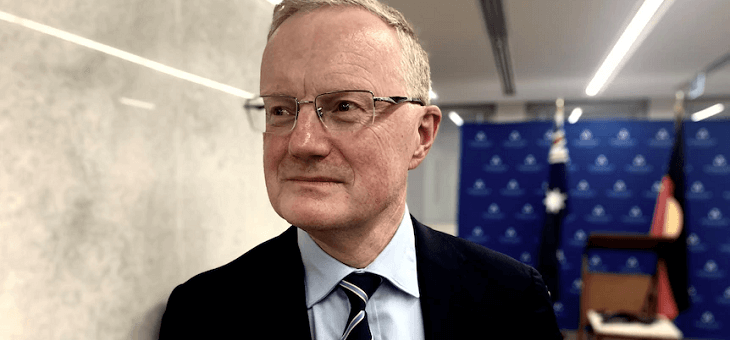The Reserve Bank Governor has warned Australians they need to be prepared for substantial interest rate rises over the rest of this year, conceding he’s not sure how high they might go.
In an interview with 7.30, his first public remarks since hiking rates by half a per cent, Philip Lowe said he expected inflation could hit 7 per cent by Christmas and predicted it wouldn’t fall until the first quarter of next year.
At a time when Australians are already grappling with rising fuel, power and grocery prices, he declared the RBA would do “what’s necessary” to get inflation back to between 2 to 3 per cent.
“It’s unclear at the moment how far interest rates will need to go up to get that,” Dr Lowe said.
“I’m confident that inflation will come down over time but we’ll have to have higher interest rates to get that outcome.”
Dr Lowe added that it was “reasonable” to think interest rates would reach about 2.5 per cent at some point, stressing they had been at emergency levels in response to the COVID pandemic and needed to gradually return to normal.
“I say that because the midpoint of our inflation target is 2.5 per cent, so an interest rate of 2.5 per cent in inflation-adjusted terms is really an interest rate of zero, which in historical terms is a very low number,” Dr Lowe said.
“How fast we get to 2.5 per cent, indeed whether we get to 2.5 per cent, is going to be determined by events.”
Under such a scenario, a family with a million-dollar mortgage would likely have to pay more than $1,000 a month extra than they were a few weeks ago.
The RBA Governor conceded some families were already struggling to make ends meet and would find the increase in repayments tough.
But he said many were well placed, pointing out that unemployment was very low, many households had built up substantial savings buffers, while others were relying on higher interest rate returns to make ends meet.
“At the individual level some people have taken loans that they may not have wanted to take out in retrospect, but the overall picture, which is really very much the focus of the Reserve Bank, is a pretty resilient economy,” Dr Lowe said.
RBA defends saying rates would not rise until 2024
Last October, the RBA was saying rates would not rise before 2024, and Dr Lowe conceded that will have influenced how much some Australians have borrowed.
He said he thought there would be a “long tail” from the pandemic and expected the economy would bounce back more slowly.
But Dr Lowe declared his comments about the economy were conditional and were not a guarantee.
“Sometimes my comments get interpreted as me having made a promise, or a very strong statement, that interest rates would stay where they were to 2024. In our own communication, in our own way of thinking, it was very much a conditional statement,” he said.
“The economy didn’t evolve as we expected, it’s been much more resilient and inflation’s been higher and we thought we needed to respond to that.”
Although Dr Lowe is warning inflation could hit 7 per cent by Christmas, he said there are already signs it will fall in the first quarter next year and again in the second quarter.
He said the supply bottlenecks in the global economy are starting to ease with a pick-up in production of things like new cars and computer chips.
“We’re not worried that declines in housing prices will affect the banking system,” Dr Lowe said.
“We’re expecting the Australian economy to continue to grow pretty strongly over the next six to 12 months. There’s still a bounce-back from all the COVID restrictions.”
He added that it was a “really good question” to consider whether the economy had been overstimulated by the RBA and the federal government during the pandemic, and whether that was the reason for the coming rate rises.
“But perhaps I can take you back to the dark days of the pandemic, back in February and March 2020,” he reflected.
“There were credible predictions that tens of thousands of Australians would be dead within a few months, that our hospitals would be overfull, that the unemployment rate would reach 15 per cent, that there’d be deep economic and social scarring in society and there’d be a generation of lost opportunity.
“We were facing incredibly scary, damaging times. We took out a lot of insurance. I think it was the right thing to do but I accept that others will have a different view. The Reserve Bank is committed to learning from that experience.”
‘The bigger fiscal issue’
With a new government in Canberra, Dr Lowe said the nation also needs to consider how the Commonwealth will continue to pay for all the things voters want.
Anthony Albanese’s government has inherited a budget with no surpluses in sight and net debt forecast to peak at around $860 billion in a few years’ time.
Economists believe that level is manageable but warn the nation’s books contain a structural hole.
In short, the country is on track to spend more than it takes in, at a time when there is increasing demand for spending on things like defence, aged care and disability services.
To fill the shortfall the federal government can raise taxes or cut spending, which are both generally politically unpopular.
Or it can embark on productivity measures, which are also often difficult to implement, to grow the economy quickly to make the overall scale of the debt smaller.
Dr Lowe said it was a discussion the nation needed to have.
“There are increasing demands on the public purse. It’s harder to find out how we’re going to pay for that,” he said.
“That’s the bigger fiscal issue.”
 © 2020 Australian Broadcasting Corporation. All rights reserved.
© 2020 Australian Broadcasting Corporation. All rights reserved.
ABC Content Disclaimer

